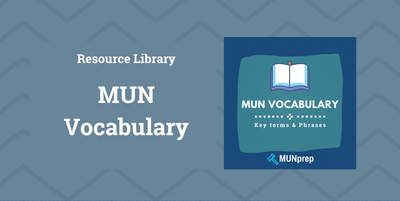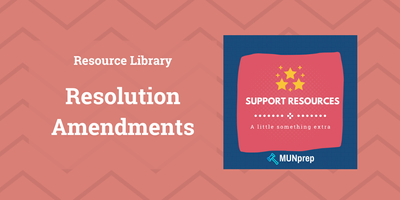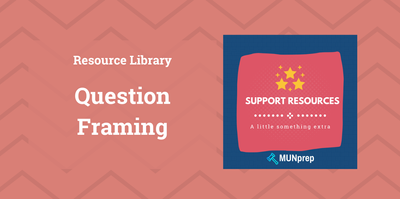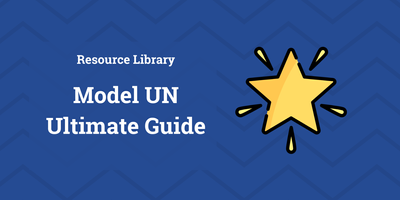MUN FAQs
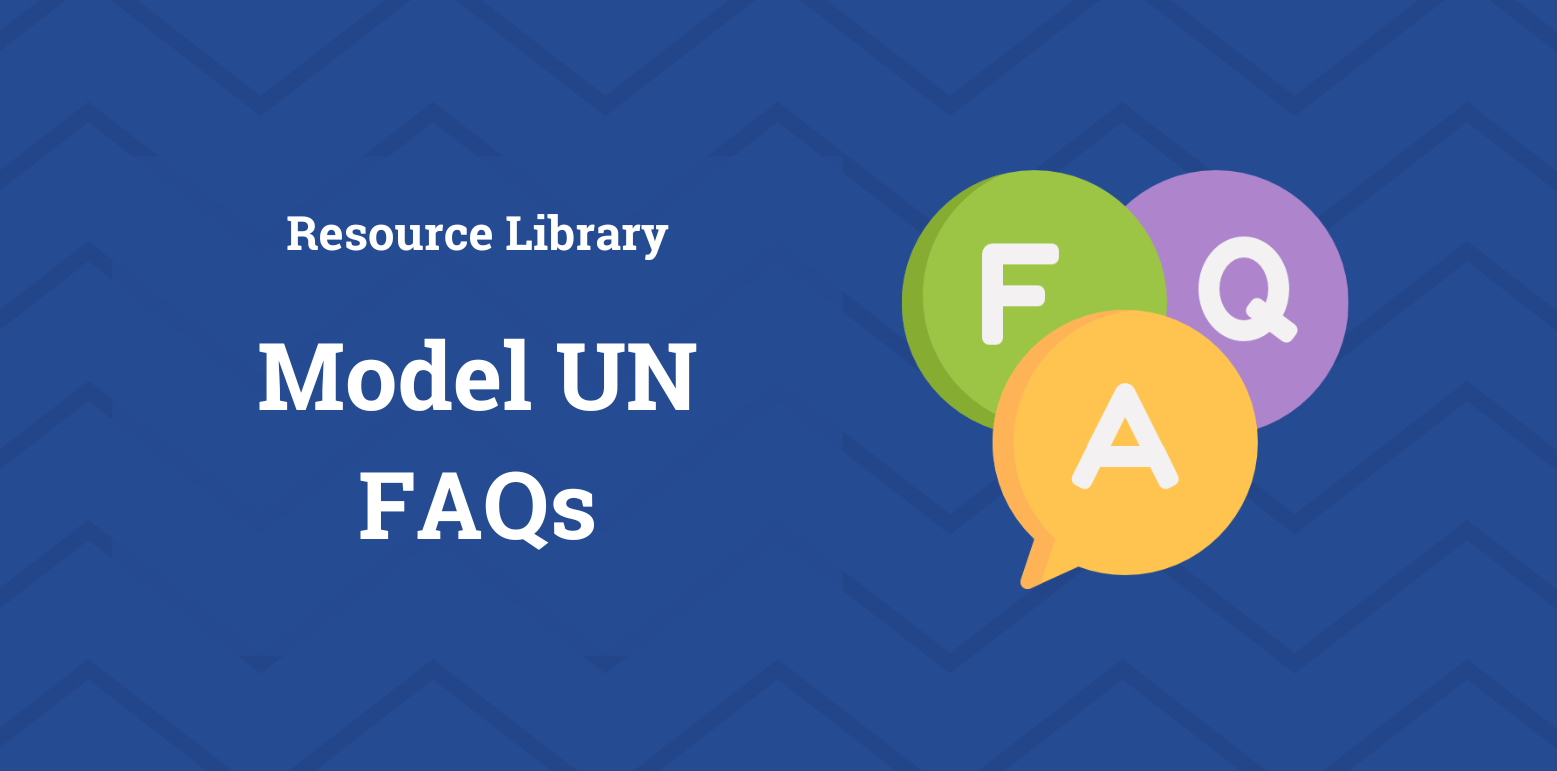
Whether you’re a student preparing for your first conference, a teacher starting a new MUN program, or a parent curious about how MUN can benefit your child, this guide is your one-stop resource for all things MUN.
Explore essential topics, from understanding the rules of procedure to crafting impactful resolutions, and find tips tailored to your needs—whether you're a beginner or an experienced delegate. Let this guide inspire confidence as you navigate the rewarding world of Model UN.
General Questions About MUN
1. What is Model United Nations (MUN)?
Model United Nations (MUN) is an educational simulation where students represent different countries and engage in debates, negotiations, and decision-making to solve global issues. Participants act as delegates of their assigned countries in a variety of UN committees, following diplomatic rules and procedures to draft resolutions addressing specific topics.
Still Curious? Click here to learn more about the Basics of Model UN
2. Who can participate in MUN?
MUN is open to students of all ages, from elementary to university level. Most programs begin in middle or high school, with adjustments made to the difficulty based on age and experience.
3. What are the main skills developed in MUN?
MUN helps students develop skills such as:
- Public speaking
- Negotiation and diplomacy
- Research and analysis
- Problem-solving
- Critical thinking
- Collaboration and teamwork
- Leadership
4. How does a typical MUN conference work?
A typical MUN conference involves several days of debate and discussion. It includes:
- Opening Ceremonies: An introduction to the conference and keynote speeches.
- Opening Speeches: Delegates give short speeches outlining their country’s stance.
- Debate: Delegates discuss, propose, and amend solutions (resolutions).
- Caucusing: Informal meetings for negotiations and drafting resolutions.
- Resolution Voting: Delegates vote on the proposed solutions.
- Closing Ceremonies: Awards are given, and the conference is officially concluded.
Still Curious? Learn more about how MUN works here!
5. What are the rules of procedure in MUN?
Rules of procedure outline the conduct of debate, specifying how delegates speak, introduce motions, ask questions, and vote on resolutions. These rules can vary slightly between conferences, but they generally include rules for points (e.g., Point of Information), motions (e.g., Motion to Open Debate), and voting procedures.
Still Curious? Learn more about the MUN Rules of Procedure here!
6. How are awards given in MUN?
Awards vary by conference but typically include:
- Best Delegate: Given to the most outstanding delegate in a committee.
- Outstanding Delegate: Given to delegates who significantly contributed to debate.
- Honorable Mention: Awarded to delegates who performed well.
- Best Position Paper: Given to delegates who write the best-prepared research papers outlining their country’s stance.
Still Curious? Learn more about Model UN awards here!
Questions for Students
7. How can I prepare for my first MUN conference?
To prepare, you should:
- Research: Study your assigned country, the topic, and your committee’s role.
- Write a Position Paper: Draft a paper outlining your country’s stance.
- Learn Rules of Procedure: Familiarize yourself with the specific rules of the conference.
- Practice Public Speaking: Rehearse opening speeches and responses to questions.
- Review Diplomacy Skills: Prepare to negotiate and build consensus.
Learn more about MUN conference prep here !
8. What should I include in my position paper?
A good position paper includes:
- Background of the Issue: Key information about the topic.
- Country’s Position: Your assigned country’s stance, backed by policies and actions.
- Proposed Solutions: Solutions that align with your country’s interests and global perspectives.
Learn more about the MUN Position Paper here!
9. How do I write a good resolution?
A resolution should include:
- Title: Describes the topic and purpose.
- Preambulatory Clauses: Outline the issue's context, using formal language (e.g., "Recognizing," "Affirming").
- Operative Clauses: Detail the proposed solutions, each starting with an action word (e.g., "Calls upon," "Encourages").
Learn more about MUN Resolutions here!
Questions for Teachers and Advisors
11. How can I start a MUN program at my school?
To start a MUN program, consider:
- Researching Resources: Look for MUN guides, training materials, and curricula.
- Recruiting Students: Hold information sessions to explain MUN’s benefits.
- Choosing Conferences: Select beginner-friendly conferences for new students.
- Scheduling Regular Meetings: Use meetings for training, simulations, and strategy planning.
Still curious? Try out our teacher Masterclass here!
12. How can I train students for MUN?
Effective training includes:
- Introductory Lessons: Teach the basics of the UN, rules of procedure, and public speaking.
- Practice Simulations: Run mock debates to simulate real MUN conferences.
- Research Sessions: Help students develop research skills and write position papers.
- Senior Students: Leverage experienced MUN delegates within your school to share insights.
Learn more about building your Model UN program here!
13. How can I help students who feel nervous about public speaking?
To ease public speaking anxiety:
- Use confidence-building exercises, such as impromptu speeches.
- Encourage small group discussions before moving to full committee debates.
- Offer feedback that focuses on strengths and gradual improvement.
Questions for Parents
14. How can MUN benefit my child?
MUN offers numerous benefits, including:
- Improved communication and presentation skills
- Broader knowledge of global issues and cultural awareness
- Enhanced problem-solving and negotiation skills
- Opportunities for leadership and collaboration
15. Why does my child need to attend multiple MUN conferences?
Attending multiple conferences allows students to:
- Apply learned skills in different settings
- Gain diverse experiences with different topics and committees
- Improve over time through practice and feedback
16. Why does my child seem busier before a conference?
In the weeks before a conference, students often have:
- Increased Research: They need to research their assigned country and topic.
- Practice Simulations: Students run through simulations to prepare for debate.
- Drafting Resolutions: Students collaborate on solutions, which can require extra meetings.
17. How can I support my child during MUN preparation?
Parents can:
- Encourage regular study and research sessions.
- Help them practice speeches at home.
- Help work through the policy-making process.
Other Common Questions
18. What is bloc formation in MUN?
Bloc formation is the process where delegates form alliances with other countries that share similar views. Blocs work together to draft and support joint resolutions.
Learn more about bloc formation in Model UN here!
19. How is MUN different from debate club?
While both involve structured discussions, MUN focuses on international diplomacy and requires delegates to represent a country’s policies. Unlike debate club, MUN emphasizes consensus-building and collaborative problem-solving.
20. Can MUN participation help with college admissions?
Yes, MUN experience is valued by colleges as it showcases skills in diplomacy, leadership, and international awareness, all of which are attractive to admission committees.
Learn more about MUN Career paths here!

